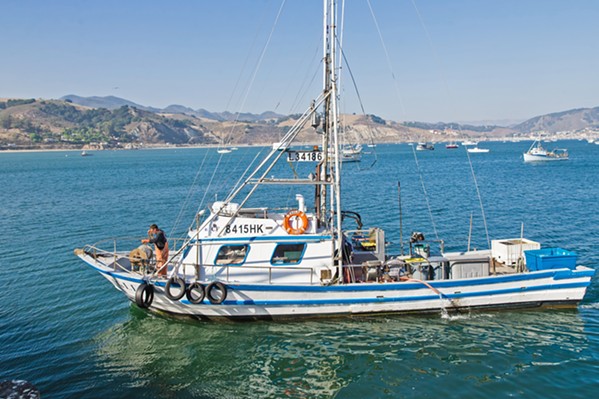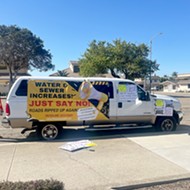[{
"name": "Newsletter Promo",
"id": "NewsletterPromo",
"class": "inlineCenter",
"insertPoint": "4",
"component": "15264767",
"requiredCountToDisplay": "0"
},{
"name": "Ad - Medium Rectangle CC01 - 300x250",
"id": "AdMediumRectangleCC01300x250",
"class": "inlineCenter",
"insertPoint": "8",
"component": "2963441",
"requiredCountToDisplay": "12"
},{
"name": "Ad - Medium Rectangle LC01 - 300x250",
"id": "AdMediumRectangleCC01300x250",
"class": "inlineCenter",
"insertPoint": "18",
"component": "2963441",
"requiredCountToDisplay": "22"
},{
"name": "Ad - Medium Rectangle LC09 - 300x250",
"id": "AdMediumRectangleLC09300x250",
"class": "inlineCenter",
"insertPoint": "28",
"component": "3252660",
"requiredCountToDisplay": "32"
}]
Commercial Dungeness crab fishermen, like 29-year-old Sean Harvell of Atascadero, are used to making their livings at sea until July, which normally marks the end of the winter-to-summer season.
For smaller crabbing outfits, especially, the late season is a crucial time to bring in their hauls, Harvell said.
"That's due to the biggest boats moving on to other fisheries," he explained. "[For] a lot of the smaller 'ma and pa' crabbing operations—whether it be here or all over the coast—a lot of that money comes in these final months."
But they won't have that chance this year.
Dungeness crab fisheries abruptly closed statewide on April 15—three months early—following a legal settlement between an environmental watchdog group, state regulators, and fishermen over the industry's alleged role in whale entanglements.
In 2017, the Center for Biological Diversity sued the California Department of Fish and Wildlife, claiming that Dungeness crabbing was at fault for a surge in entanglements—predominately among humpback and gray whales—on the West Coast that peaked at 71 cases in 2016.
In most cases, the outcome of whale entanglements remains unknown, however it can be fatal. In 2016 no deaths were reported in connection with entanglements, according to the National Oceanic Atmospheric Administration (NOAA). In 2015, there were 61 entanglements with one reported death, and in 2014 seven died after being entangled, according to NOAA.
The parties settled the suit in federal court in March. While its long-term aim is to force the state to obtain federal take permits under the Endangered Species Act, the settlement requires fisheries to close early this spring during whale migration season as an interim measure.
Local fishermen told New Times that the closure order blindsided them and will put thousands of crabbers out of work without notice.
"We prepare for slow seasons. We don't prepare for no seasons," said Lori French, who's part of a third generation Morro Bay fishing family and a board member at Central Coast Women for Fisheries. "Everybody was totally caught off guard. The younger fishermen who don't have other fisheries to go to, this is going to kill them. It's just morally not right."
One of those young men is Harvell, who said he's lost his source of income until October with the closure. Like many crab fishermen, Harvell travels up and down the coast for work—from Eureka to Morro Bay.
"I was due to be back at work in the next couple of weeks," he said. "Now I don't have a job to go back to."
Fishing industry members acknowledged that Dungeness crabbing has likely played a role in the entanglement uptick since 2014. But they say it's been disproportionately targeted as the culprit—and given an extreme punishment.
"I'm not saying we're innocent by any means as far as things that could happen in the ocean with any fishing industry," Harvell said, "but we're not the main source of this issue."
French—who's also on the board of the Pacific Coast Federation of Fishermen's Associations, a party in the Center for Biological Diversity lawsuit—said crab fishermen have been trying to address entanglements. Prior to the lawsuit, industry leaders were in talks with the state about ways to curb them, such as changing equipment designs.
"We've been working on ways to avoid it," she said. "We don't want to entangle whales. They are majestic creatures."
French called the record 2015-16 season an anomaly. That year, she said, high levels of toxic domoic acid in the ocean closed fisheries in the early season, creating a rush in the spring. The unusually high presence of the acid, which stems from algae blooms, was bred by warmer water temperatures.
"It had never happened before," French said.
Of the 71 whale entanglement cases in 2016, investigators were able to confirm the cause for about one third of them; Dungeness crab fishing gear was at fault for the majority, according to Center for Biological Diversity senior attorney Catherine Kilduff.
"It won't eliminate entanglements, but it focuses on the segment where we know most of the entanglements are happening," Kilduff told New Times about the early season closure. "Those pots are being set where we know the whales are, in the season [they're migrating]."
Since 2016, entanglements have tapered, with 26 cases documented off California's coast in 2017 and 35 in 2018. The numbers are still higher than historic averages, according to NOAA.
Crabbing operations that use "ropeless gear" can continue under the settlement, Kilduff noted. But locals said that technology is scarce and cost prohibitive for many.
"It's a unicorn," French said.
The rules for future seasons are murky. It will take a few years for the state to obtain endangered species permits. This summer, stakeholders will convene to formulate industry regulations in light of the settlement.
Meanwhile, fishermen are grappling with the early season closure, and what may come next.
"Locally, I see it impacting generations of families who have fished and crabbed out of Morro Bay," Harvell said. "They are literally devastating generations of family fishing. It's really heartbreaking." Δ
Assistant Editor Peter Johnson can be reached at [email protected].
Latest in News
Readers also liked…
-

Coast Unified teachers upset over new position's salary and qualifications
Oct 20, 2022 -

SLO police identify alleged driver who hit and killed couple
Dec 22, 2022 -

When the levee breaks: Oceano residents, county officials walk a tightrope of regulations to manage Arroyo Grande Creek, which some say led to the levee's failure in January
May 18, 2023









